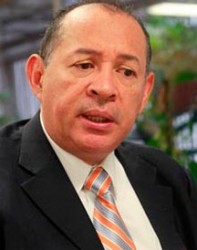CARACAS, (Reuters) – Venezuelan President Nicolas Maduro unexpectedly named a new head of the country’s central bank yesterday, appointing Eudomar Tovar less than four months after installing a former commerce minister in the post.
The nomination was approved by lawmakers in the National Assembly, which is dominated by Maduro’s supporters. Tovar, 56, is an economist who was the head of Venezuela’s currency exchange board, CADIVI, and before that served as a vice president at the central bank.
“Congratulations … we’ll keep creating a Prosperous Economy for the people,” Maduro said on Twitter, alongside a photograph of Tovar sitting at a desk.

Tovar replaces Edmee Betancourt, an industrial engineer and former commerce minister who was named to lead the bank by Maduro at the end of April. Betancourt’s predecessor, Nelson Merentes, left the central bank to become finance minister.
Tovar graduated from the University of Carabobo in 1981, and also has a masters degree from the Central University of Venezuela, specializing in customs and foreign trade.
Local think-tank Ecoanalitica said his appointment was positive because he represented the more market-friendly pragmatism of Merentes, when compared with the radical socialism of former finance minister Jorge Giordani.
“With Tovar’s designation at the central bank, Merentes has acquired more power over the economic cabinet,” it said.
Merentes and Tovar face tough challenges including slowing economic growth and high inflation following a devaluation of the local bolivar currency in February and heavy state spending last year that helped Hugo Chavez win re-election as president shortly before his death from cancer.
Annual inflation hit 42.6 percent in July, one of the highest rates in the world, and many economists expect growth could drop to 2 percent this year, from 5.6 percent in 2012.
The government also has to contend with public angst over sporadic shortages in stores and complaints from businesses about lack of access to hard currency.
A decade-long currency control system is struggling to provide enough dollars to the import-dependent economy, creating shortages that range from motorcycle parts to wheat flour.









